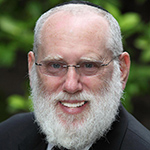By Rabbi Bentzion Kravitz

LOS ANGELES — One afternoon, while watching my grandchildren at the park, I was approached by a young Christian woman. She noticed that I was Jewish and asked if I offered animal sacrifices as described in the Bible.
I explained that sacrifices were offered only in the Temple, and since its destruction, we were instructed to “Offer our prayers in place of sacrifices” (Hosea 14:1-3).
Unconvinced, she disrespectfully told me I was going to hell because without sacrifices I could not get rid of my sins. As proof, she insisted that the bible states, “Without the shedding of blood there is no atonement for sin.”
This woman, as well as most missionaries, believes that according to the Bible blood sacrifices are the “only way” to achieve forgiveness for sin. They mistakenly conclude that without the atoning power of sacrifices, our only option is to accept Jesus as our “savior who died for our sins.”
I was familiar with this line of reasoning, so I challenged the woman to show me where it says, “Without the shedding of blood there is no atonement for sin.”
Predictably, she opened her bible to Leviticus 17:11, which states, “I have given you blood to make atonement.” I immediately pointed out that the wording in this verse is different from what she originally said. Furthermore, the verse does not say blood is the “only way” to make atonement. She was dumbstruck when I pointed out that her proof text is from the New Testament, rather than Leviticus, and actually says, “according to the law, one might almost say without blood there is no atonement” (Hebrews 9:22).
She couldn’t believe that the verse includes the word “almost,” which emphasizes that blood is not the only way to receive atonement. For example, the Torah says the Jewish people were saved from a plague when “Aaron offered incense and made atonement for them” (Numbers 16:47). In another example, atonement was achieved by offering “golden vessels and jewelry” (Numbers 31:50).
Although the Talmud states, “There is no atonement without blood” (Yoma 5a), in context our sages were teaching that the act of sprinkling the blood on the side of the Altar was a necessary part of the multistep sacrificial process.
Clearly, our sages did not believe blood was the only way to achieve atonement since they also stated that “confession achieves atonement” (Yoma 36b).
In the Torah portion, Ki Tisa (Exodus 30:11–34:35), there is another striking example of atonement being achieved without blood. The Jews were commanded to “contribute half a silver shekel [silver coin] as an offering to atone for your souls” (Exodus 30:15).
God’s decree that a half-shekel can provide atonement is so significant King Solomon proclaimed, “Charity saves from death” (Proverbs 10.2), and “Charity gives life” (Proverbs 11:19). Another powerful lesson is derived from the requirement that a half-shekel was offered, rather than a full shekel.
The biblical Hebrew word for “half” is [מחצית–machatzit]. Our sages point out that the middle letter of this word is a [צ–tzadik] which is similar to the Hebrew word for “charity” [צדקה–tzedakah]. The letters at the far extremes of this word spell the word [מת–meit], which means death and signifies that death, so to speak, surrounds us, as it is stated, “Death is the destiny of everyone” (Ecclesiastes 7:2). However, the letters immediately to the right and left of the letter [צ–tzadik] spell the word [חי–chai], which means life, signifying that when a person gives charity, he receives life.
Our sages explain that Moshe found it difficult to understand the half-shekel and, specifically, how individuals could be asked to give away their hard-earned money. In response, God showed him a “half-shekel of fire” to teach Moses that in the same way a flame is not diminished when you allow someone to light a candle from your flame, so too, giving charity does not diminish what you have; it keeps on giving.
With this in mind, we should increase our acts of kindness and take to heart the words of Solomon, who said, “Doing charity and justice is more acceptable to God than sacrifice” (Proverbs 21:3).
Today, our prayers, repentance, and acts of charity take the place of the Temple sacrifices and provide an easily accessible way to atone for our mistakes and return to God.
*
Rabbi Kravitz is the executive director of Jews for Judaism, which he founded to combat the theology of Jews for Jesus and other Christian missionary groups.
A couple of young, Mormon “elders” came to my door and commented on the mezuzah. I invited them in, and we had a conversation. At one point, they demonstrated how woefully misinformed they were about Judaism, thinking that “wine” actually referred to unfermented grape juice, and I laughed out loud. They did not know how to react to that. They insisted that this was what they were taught. I countered with my own lived experience, which they could not refute. And I think “missionaries” of many stripes come from a similar place. They know only what they were taught and have difficulty processing information that counters these lessons. It is a sad head space to live in.